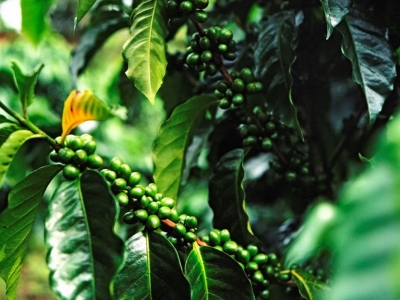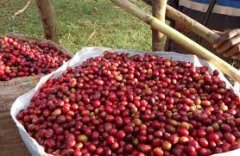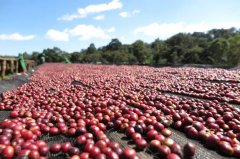Description of the unique flavor and taste of SantaAnita Manor in Costa Rica
For professional baristas, please follow the coffee workshop (Wechat official account cafe_style)

Costa Rica-Santa Anita (SantaAnita) Manor Rainforest Union (RA) Manor Bean
The coffee beans produced in Costa Rica are of the most stable quality among Central American coffee, mainly because Costa Rican coffee grows in complete shade, a cool rainy night and a large temperature difference in the morning and evening. In addition, rich soil and stable progress in the middle and later stage of the treatment process, and through the combination of organized coffee estates and national coffee policy, so that the reputation of Costa Rican coffee production will not fall. It has long been an indicator of coffee in Central America. The more famous producing areas are Tarazhu, Sanshui River, Central Valley, and so on, but with the encouragement of coffee competition, the coffee produced by many coffee estates is becoming more and more refined. More and more small and beautiful previously little-known estates gradually increase their popularity so that the world can taste multi-level and variety of Costa Rican coffee beans.
The current middle treatment method in Costa Rica is divided into two ways: the traditional washing method and the most popular honey treatment method (Miel Process). The water treatment emphasizes that the taste is clear, clean and acidity dies like a razor, while the honey treatment emphasizes the rich taste and increases sweetness by reducing acidity.
Costa Rica Santa Anita (SantaAnita) manor bean is rainforest alliance (RA) certified coffee, the manor is located in the famous Tarazu producing area, is an excellent manor for natural washing method, coffee grows in the rainforest protection area of 1500 ~ 2500 meters above sea level, the coffee manor tries its best to protect the rainforest ecology from chemical fertilizers and pesticides, and the very strict planting and treatment process is the Costa Rican coffee farm certified by the Rainforest Alliance. SantaAnita is an absolutely clean, clear and elegant coffee with no extra flaws.
Santa Anrita (SantaAnita) manor handles coffee beans very cleanly. The proportion of hand-selected coffee beans is about 3.5%. The weight loss ratio of roasted to light-roasted (city) coffee beans is 14%, and the proportion of empty shell beans to bad beans is 4%. Certified washed beans have the characteristics of less defective beans, less defective beans, the same appearance, less dandruff. It can lower the end temperature of steaming and make the acidity increase (close to the acidity of grapefruit) to show a sharp side, and it can also increase the end temperature of steaming to make the acid change more gently, which is a good method of shallow baking. (PS. The end temperature of steaming must be within a reasonable range.) it is a Costa Rican mountain bean with bright and sharp citrus acid.

Shallow baking City (fragrance): the dried aroma of ground almonds gives off a fresh green orange aroma after being boiled, the citrus acid is sharp and clean, the taste is bright and clear, and the sweetness of sugar lasts in the mouth for a period of time.
Medium roasting (general B): after the coffee is ground, you can smell a touch of sour berries. After brewing, the taste of Assam black tea is accompanied by sufficient caramel sweetness, the taste is similar to smooth and sweet orange water, and the subtle raspberry acidity slowly turns into sweetness. The aroma and sweetness are perfectly integrated. A sip of plain boiled water can wash away the acidity and slowly ignite bursts of tea in the nose.
Heavy baking (general C): the light cheese aroma is particularly evident when the bean is ground, when the raspberry acid disappears and the sugar is sweet, the taste is not thick and maintains the usual Costa Rican fresh and clean style, and the floral aroma of chamomile is delightful in the finish.
Important Notice :
前街咖啡 FrontStreet Coffee has moved to new addredd:
FrontStreet Coffee Address: 315,Donghua East Road,GuangZhou
Tel:020 38364473
- Prev

El Salvador-Monterey Manor, famous for its sweetness and perfection, gives a detailed introduction
For the exchange of professional baristas, please follow the coffee workshop (Wechat official account cafe_style) El Salvador-Monterey (Monterey) Manors Rainforest Alliance (RFA) United States Department of Agriculture (USDA) certification El Salvador coffee production has attracted worldwide attention in recent years, which is the result of close cooperation between small coffee farmers and international coffee organizations (groups) that help improve farming and handling methods.
- Next

Introduction and description of several characteristic varieties of YCFCU Cooperative in Ethiopia
For the exchange of professional baristas, please follow the coffee workshop (Wechat official account cafe_style) Yega Xuefei Coffee Farmers Union Cooperative Yirgacheffe Coffee Farmers Cooperatives Union (YCFCU) Yega Xuefei Coffee Farmers Union Cooperative (YCFCU) represents 26 cooperatives in the Gedeo district of southern Ethiopia, located in Yejasuefei, Jettip and WA.
Related
- Does Rose Summer choose Blue, Green or Red? Detailed explanation of Rose Summer Coffee plots and Classification in Panamanian Jade Manor
- What is the difference between the origin, producing area, processing plant, cooperative and manor of coffee beans?
- How fine does the espresso powder fit? how to grind the espresso?
- Sca coffee roasting degree color card coffee roasting degree 8 roasting color values what do you mean?
- The practice of lattes: how to make lattes at home
- Introduction to Indonesian Fine Coffee beans-- Java Coffee producing area of Indonesian Arabica Coffee
- How much will the flavor of light and medium roasted rose summer be expressed? What baking level is rose summer suitable for?
- Introduction to the characteristics of washing, sun-drying or wet-planing coffee commonly used in Mantenin, Indonesia
- Price characteristics of Arabica Coffee Bean Starbucks introduction to Manning Coffee Bean Taste producing area Variety Manor
- What is the authentic Yega flavor? What are the flavor characteristics of the really excellent Yejasuffi coffee beans?

